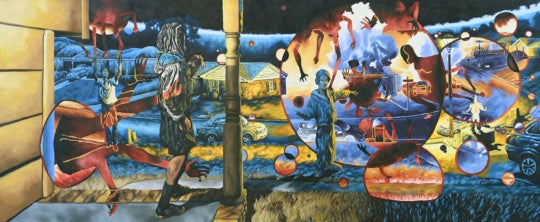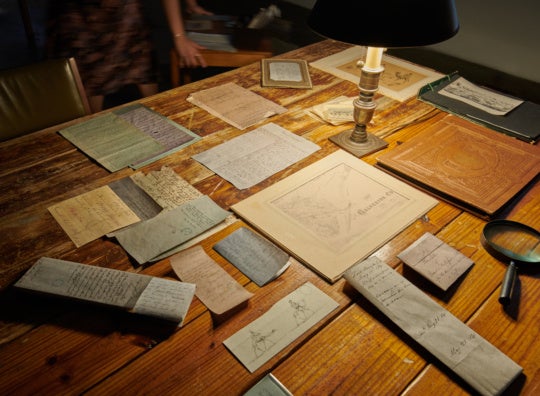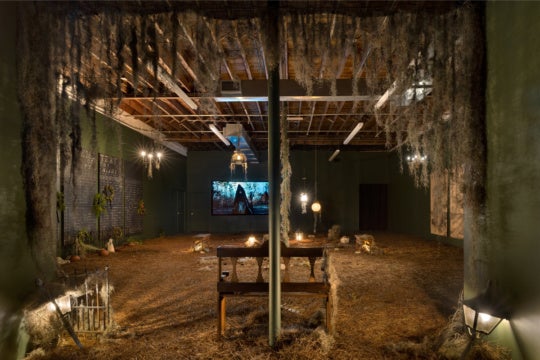
When the student is ready, the teacher will disappear.
My unattributed quip will have to do, marking go for these 500 words on Public Domain’s magnum opus “Apparent Horizon,” on view at Eyedrum through July 3.
“Apparent Horizon” is a mature position statement from a trio (Robert Cheatham, Jim Demmers, Chea Prince) mostly well past qualification for 40-under-40 lists and yet, to judge from reaction, still spectacularly unknown.
I have heard no commercial gallerist declare familiarity with the piece.
Familiarity, in turn, is not an easy goal. There are approximately 15 words of explanatory wall text, to situate an exhibition whose subtitle itself, “Deep Time, Surveillance and the De/Reconstitution of the Human Subject,” is more than half that length.
Text is certainly of interest to Public Domain. Cheatham is a longtime experimental publisher—of titles like Close to Impenetrable—and the accompanying catalogue, itself not present in the gallery, is more than 40 pages long.

Still, the installation itself takes place mostly apart from the word. Where there is written text in the pieces themselves, for example, it is deeply buried in a staticky white-on-white presentation, crawling past six words at a time. Rather than defy your reading, PD dares it: as if the texts were somehow illicitly reclaimed from the buffer of an old 8-bit CG-and-titles engine. This letter-generating TV machine, for all we know, might as well have belonged to Bernard Stiegler himself, or else, went missing from pseudo.com sometime in the ’90s.
Otherwise text-free, the installation requires seven projectors, three towers (plastic, steel, and stone), two monitors, and one dis-figural sculpture that could easily have crawled from the ear of Pavel Chekov in Star Trek II: Wrath of Khan. Here, the sculpture stands tall as a tall person, in a corner scattered with sand. Beside it are half a dozen stunning light box transparencies, and a dozen paintings in a palette of white and black.

The viewer’s task is to integrate the projections of collapsing glaciers and underwater coral with projections of abandoned steel infrastructure and of yawning canyons – and to integrate all these projections of environment at massive scale with the intimate paintings of eyes set in study, above a tiny horizon of ink, and, with the back and forth millings of a surveilled mass of you and of me. There is a profound sense of loneliness, and perhaps even a bitterness in the work.
Thus to experience all of this together, as if it were some giant, scale-shifting gestamkunstwerk, can be daunting. Sense-making here communes with desperation, and this appears to be the point. “Apparent Horizon” is through and through a meditation on digital and political practice. It is coherent and uniform as a work of thought: a landscape of landscapes only somewhat relieved by abstraction at intimate scale. To find one’s place within it, and discover a means to inhabit the installation, is to court the dystopia that lurks, throughout, in plainest sight.
“Apparent Horizon,” and your efforts to make sense of it – squinting into a whorl of white lettering, abandoned in the depths of TV – can leave you cold if you make sure to dart away. But it could easily make you cry if you let it.
Al Matthews is a sound and video artist based in Atlanta.




